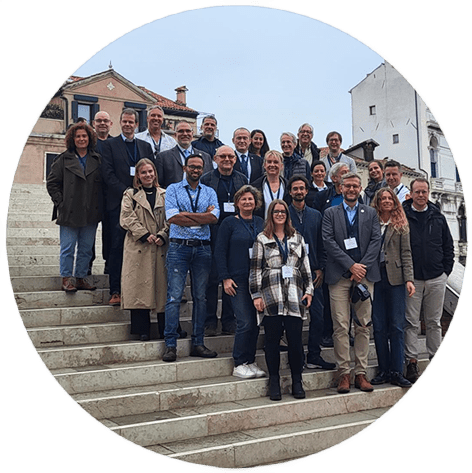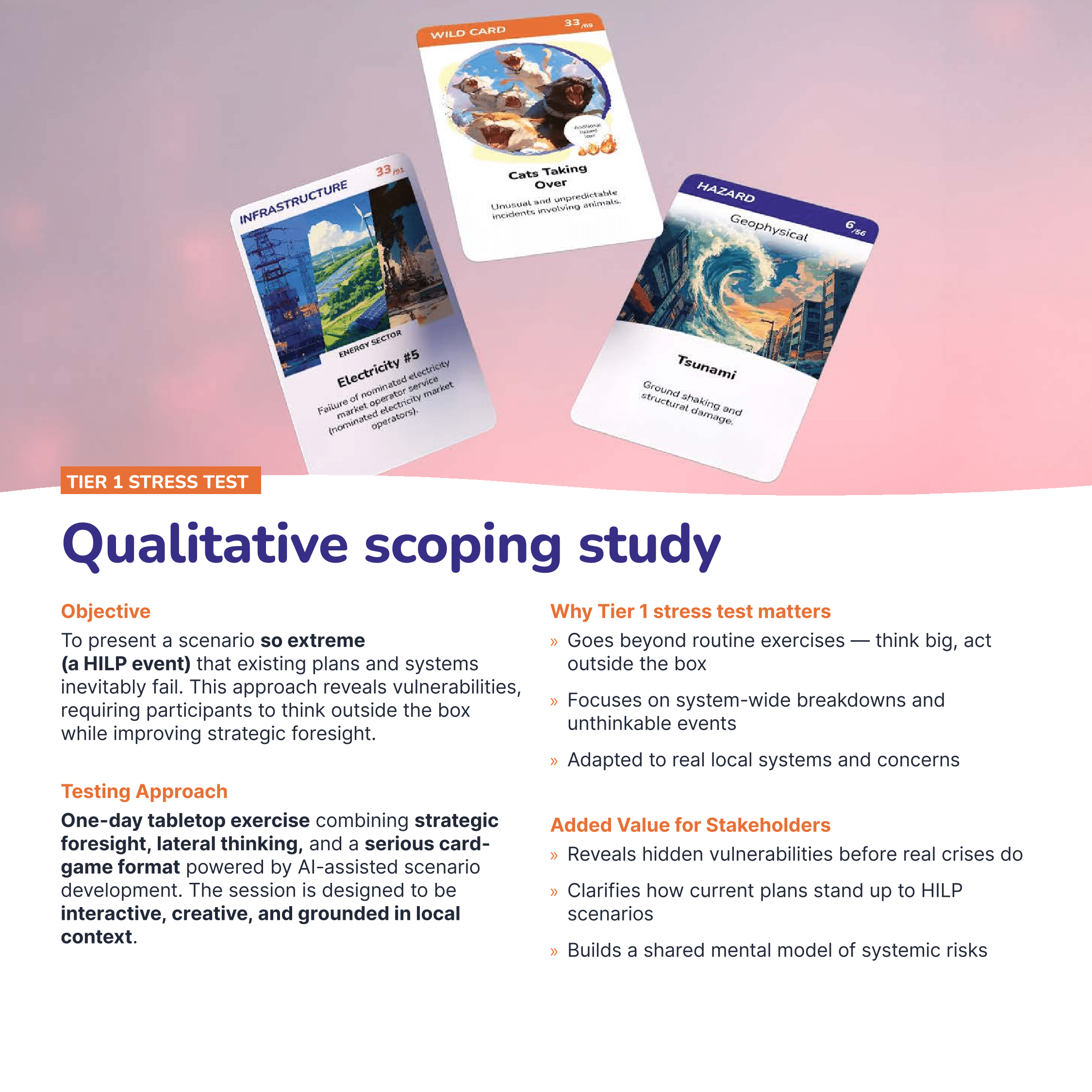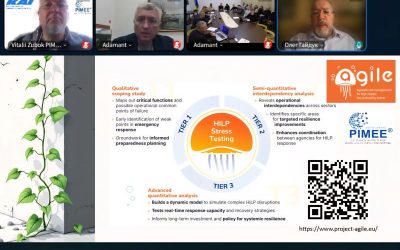AGILE
AGnostic risk management for high Impact Low probability Events
The AGILE project, funded by the European Union and UKRI, is a beacon of innovation in Disaster Risk Management (DRM). It brings together a transdisciplinary consortium comprising research organizations, NGOs, SMEs, first responders and local/regional authorities to design, develop, and apply a comprehensive methodological framework and practical tools for understanding, anticipating, and managing High Impact Low Probability (HILP) events with a systemic risk and resilience perspective. This research approach is dedicated to implementation by and for practitioners’ and policy-makers’ needs and requirements on local, regional and national levels. AGILE will combine and integrate a wide range of established and innovative methodologies into a novel and replicable multi-sectoral risk and resilience stress testing methodology.
Mission
To empower DRM stakeholders on local, regional, and national levels with improved capacities and capabilities. Through innovative methodologies and collaboration, we aim to enhance societal resilience to new and emerging risks, ultimately contributing to a safer and more secure future.
Vision
AGILE envisions a world where risk management is not only based on well-characterized threats but also includes a systemic, risk-agnostic perspective. Our vision is to provide stakeholders with the tools and knowledge needed to confidently meet the challenges posed by HILP events. AGILE is fostering a global community that is proactive, resilient, and well-prepared for the uncertainties of the modern age.

Gordana Cveljo
Project Coordinator
AGILE’s multi-disciplinary knowledge base, the validated toolkit for stress tests and the guidelines for capacity development aims to improve societal resilience and mitigate the impact of unexpected or cascading events. By utilizing these tools, practitioners and first responders will be enabled to enhance their resilience and operational readiness to various threats posed by HILP events.

Gianluca Pescaroli
Project Scientific Lead
In an increasingly uncertain world, we operate under the assumption that disruptions are inevitable and will have unpredictable cascading effects. Through AGILE, we aim to revolutionize the preparation and management of HILP events. By identifying common points of failure across different threats, we seek to enhance the organization’s capacity to handle complex crises. For this, we will develop and apply a new stress testing methodology that could enhance system wide resilience.
Our results
HILP Definition
High Impact Low Probability Events (HILPs) are rare events that may result in catastrophic impacts on people, infrastructure, utilities, critical services, and wider societal functions. These events are characterized by a lack of precedence, high levels of uncertainty in their predictability, and combinations of effects, often coming as surprises or shocks. They may not meet defined thresholds for mitigation actions and will require innovative, creative approaches to raise awareness, leverage established capabilities, and enhance both short- and long-term preparedness.

Who we are
The AGILE consortium comprises Universities, Research Centers, NGOs, First responders, and local, regional and national authorities from 10 different countries.
News & Events
XVI Ukrainian Internet Governance Forum (IGF-UA 2025)
Kyiv, Ukraine
4th AGILE General Assembly in Rotterdam
Rotterdam, The Netherlands
6th Annual Meeting of the Society for Risk Analysis Europe – Iberian Chapter
Évora, Portugal
Throughout the scientific development phases of the project, co-creation approaches will be of central importance. Close collaboration with various non-scientific staff and key-stakeholders (e.g., practitioners, regional, national, and EU-level policymakers, and DRM researchers), who will be setting the key-requirements and criteria for the development and later assessment of the methodologies, approaches and tools will therefore be engaged in all elements and activities of the project.
- Definitions and taxonomy for High Impact Low Probability (HILP) and outlier events3363
- Progressing the research on systemic risk, cascading disasters, and compound events3360
- Assessment and improvement of digital resilience in the energy crisis caused by missile strikes3358
- A Method for Reducing the Uncertainty Caused by a Power Outage During a Cyber Incident Response3355
- Root cause of Critical Infrastructure Failures in the 2023 Southeast Turkey Earthquake: A case study from Hatay3351
- High-Impact Low-Probability events and Systemic Resilience: A Network-Based Methodology and its application to the metropolitan city of Venice3348
- XVI Ukrainian Internet Governance Forum (IGF-UA 2025)3321show_this_date_on_the_website : 20-21 November 2025
- 4th AGILE General Assembly in Rotterdam3315show_this_date_on_the_website : 25-26 September 2025
- 6th Annual Meeting of the Society for Risk Analysis Europe – Iberian Chapter3309show_this_date_on_the_website : 18-19 September 2025
- ESREL SRA-E 20253303show_this_date_on_the_website : 15-19 June 2025
- AGILE Scientific Lead in Crisis Response Journal on HILP Events3297show_this_date_on_the_website : Summer, 2025
- EC Review Meeting3291show_this_date_on_the_website : 12 May 2025
- AGILE Scientific Lead Featured in BBC News on the Growing Demand for Risk Management Expertise3285show_this_date_on_the_website : 10 March 2025
- World Bosai Forum 20253278show_this_date_on_the_website : 7-9 March 2025
- EU-Japan Forum on Research and Innovation Communication in Support of Disaster Societal Resilience and Risk Governance3268show_this_date_on_the_website : 3 March 2025
- Gianluca Pescaroli’s Interview in CGTN Europe3256show_this_date_on_the_website : 15 January 2025
- XVII Conference of Environmental Psychology3250show_this_date_on_the_website : 3-6 February 2025
- Forschung für den Bevölkerungsschutz3236show_this_date_on_the_website : 5-7 February 2025
- AGILE Newsletter 20253213show_this_date_on_the_website : 02 January 2026
- SRA Iberia Poster2582
- BMBF Poster2579
- Civil Protection Forum Poster2575
- Project Concept Flyer2569
- HILP Workshop Flyer2565
- D1.1 HILP Taxonomy and Definitions997
- D1.2 AGILE’s Approach to HILP2602
- D1.3 AGILE’s approach to HILPs3337
- D2.1 HILP Platform Requirements and Architecture2606
- D3.1 ST Methodology Framework and Toolkit2610
- D4.1 Case study scenarios3335
- D6.1 AGILE – Impact Strategy2613
- D6.2 Interim Report on the Implementation of the Impact Strategy3340
- D7.1 Project Management Plan2616
- D7.2 Project Risk Management Plan2619
- D7.3 Data Management Plan (DMP)2623
- COP292558show_this_date_on_the_website : 18 November 2024
- Innovation & Technology Expo2552show_this_date_on_the_website : 16-17 October 2024
- 2nd General Assembly Meeting2547show_this_date_on_the_website : 8-10 October 2024
- 5th Annual Meeting of the Society for Risk Analysis-Europe Iberian Chapter2541show_this_date_on_the_website : 2-3 September 2024
- International Conference on Resilient Systems2536show_this_date_on_the_website : 28-30 August 2024
- SPARK: Seminar Platform for Adaptive Resilience Knowledge2531show_this_date_on_the_website : 22 August 2024
- UK Alliance for Disaster Research Conference2524show_this_date_on_the_website : 26-27 June 2024
- Project to Policy Seminar2522show_this_date_on_the_website : 20 June 2024
- HILP Reference Library Development Workshop2516show_this_date_on_the_website : 20 June 2024
- European Union Civil Protection Forum2510show_this_date_on_the_website : 4-5 June 2024
- Disaster Expo Europe2504show_this_date_on_the_website : 15-16 May, 2024
- BMBF – Innovationsforum, “Zivile Sicherheit”2493show_this_date_on_the_website : 7-8 May, Berlin, Germany
- Humanitarian Networks and Partnerships Weeks2499show_this_date_on_the_website : 29 April – 10 May 2024
- Management of Disaster Risk and Societal Resilience (MADIS)2483show_this_date_on_the_website : 19-21 March 2024
- 1st General Assembly Meeting2482show_this_date_on_the_website : 19 March 2024
- Definitions and taxonomy for High Impact Low Probability (HILP) and outlier events3363
- Progressing the research on systemic risk, cascading disasters, and compound events3360
- Assessment and improvement of digital resilience in the energy crisis caused by missile strikes3358
- A Method for Reducing the Uncertainty Caused by a Power Outage During a Cyber Incident Response3355
- Root cause of Critical Infrastructure Failures in the 2023 Southeast Turkey Earthquake: A case study from Hatay3351
- High-Impact Low-Probability events and Systemic Resilience: A Network-Based Methodology and its application to the metropolitan city of Venice3348
- XVI Ukrainian Internet Governance Forum (IGF-UA 2025)3321date_for_the_last_day_of_the_event : 20251121
- 4th AGILE General Assembly in Rotterdam3315date_for_the_last_day_of_the_event : 20250925
- 6th Annual Meeting of the Society for Risk Analysis Europe – Iberian Chapter3309date_for_the_last_day_of_the_event : 20250919
- ESREL SRA-E 20253303date_for_the_last_day_of_the_event : 20250616
- AGILE Scientific Lead in Crisis Response Journal on HILP Events3297date_for_the_last_day_of_the_event : 20250602
- EC Review Meeting3291date_for_the_last_day_of_the_event : 20250512
- AGILE Scientific Lead Featured in BBC News on the Growing Demand for Risk Management Expertise3285date_for_the_last_day_of_the_event : 20250310
- World Bosai Forum 20253278date_for_the_last_day_of_the_event : 20250307
- EU-Japan Forum on Research and Innovation Communication in Support of Disaster Societal Resilience and Risk Governance3268date_for_the_last_day_of_the_event : 20250303
- Gianluca Pescaroli’s Interview in CGTN Europe3256date_for_the_last_day_of_the_event : 20250115
- XVII Conference of Environmental Psychology3250date_for_the_last_day_of_the_event : 20250203
- Forschung für den Bevölkerungsschutz3236date_for_the_last_day_of_the_event : 20250205
- AGILE Newsletter 20253213date_for_the_last_day_of_the_event : 20260102
- SRA Iberia Poster2582
- BMBF Poster2579
- Civil Protection Forum Poster2575
- Project Concept Flyer2569
- HILP Workshop Flyer2565
- D1.1 HILP Taxonomy and Definitions997
- D1.2 AGILE’s Approach to HILP2602
- D1.3 AGILE’s approach to HILPs3337
- D2.1 HILP Platform Requirements and Architecture2606
- D3.1 ST Methodology Framework and Toolkit2610
- D4.1 Case study scenarios3335
- D6.1 AGILE – Impact Strategy2613
- D6.2 Interim Report on the Implementation of the Impact Strategy3340
- D7.1 Project Management Plan2616
- D7.2 Project Risk Management Plan2619
- D7.3 Data Management Plan (DMP)2623
- COP292558date_for_the_last_day_of_the_event : 20241118
- Innovation & Technology Expo2552date_for_the_last_day_of_the_event : 20241017
- 2nd General Assembly Meeting2547date_for_the_last_day_of_the_event : 20240810
- 5th Annual Meeting of the Society for Risk Analysis-Europe Iberian Chapter2541date_for_the_last_day_of_the_event : 20240903
- International Conference on Resilient Systems2536date_for_the_last_day_of_the_event : 20240830
- SPARK: Seminar Platform for Adaptive Resilience Knowledge2531date_for_the_last_day_of_the_event : 20240822
- UK Alliance for Disaster Research Conference2524date_for_the_last_day_of_the_event : 20240627
- Project to Policy Seminar2522date_for_the_last_day_of_the_event : 20240620
- HILP Reference Library Development Workshop2516date_for_the_last_day_of_the_event : 20240620
- European Union Civil Protection Forum2510date_for_the_last_day_of_the_event : 20240505
- Disaster Expo Europe2504date_for_the_last_day_of_the_event : 20240516
- BMBF – Innovationsforum, “Zivile Sicherheit”2493date_for_the_last_day_of_the_event : 20240508
- Humanitarian Networks and Partnerships Weeks2499date_for_the_last_day_of_the_event : 20240510
- Management of Disaster Risk and Societal Resilience (MADIS)2483date_for_the_last_day_of_the_event : 20240321
- 1st General Assembly Meeting2482date_for_the_last_day_of_the_event : 20240319




